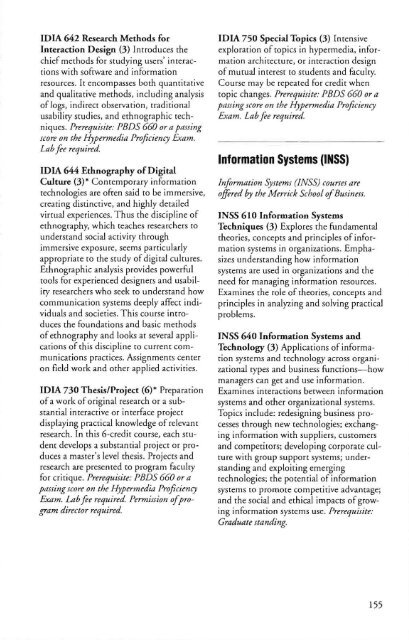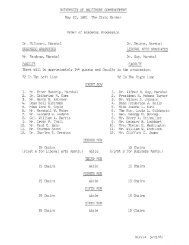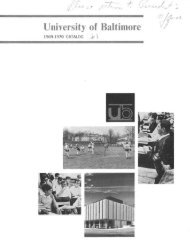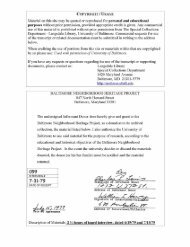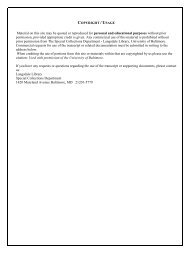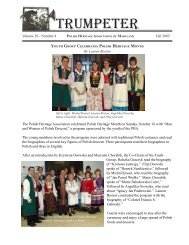2003-2005 - Special Collections - University of Baltimore
2003-2005 - Special Collections - University of Baltimore
2003-2005 - Special Collections - University of Baltimore
You also want an ePaper? Increase the reach of your titles
YUMPU automatically turns print PDFs into web optimized ePapers that Google loves.
IDlA 642 Research Methods for<br />
Interaction Design (3) Introduces the<br />
chief methods for studying users' interactions<br />
with s<strong>of</strong>[Ware and information<br />
resources. h encompasses both quantitative<br />
and qualitative methods, including analysis<br />
<strong>of</strong> logs, indirect observation, uaditional<br />
usabiliry studies, and ethnographic techniques.<br />
Prerequisite: PBDS 660 or a passing<br />
score on the Hypermedia Pr<strong>of</strong>iciency Exam.<br />
Lab fee required.<br />
IDlA 644 Ethnography <strong>of</strong> DigitaI<br />
Culture (3)* Contemporary information<br />
technologies are <strong>of</strong>ten said w be immersive,<br />
creating distinnive, and highly detailed<br />
vinuaJ experiences. Thus the discipline <strong>of</strong><br />
ethnography, which teaches researchers w<br />
undemand sociaJ aniviry through<br />
immersive exposure, seems panicularly<br />
appropriate w the study <strong>of</strong> digitaJ cuhures.<br />
Emnographic anaJysis provides powerful<br />
wols for experienced designers and usabiliry<br />
researchers who seek w understand how<br />
communication systems deeply affect individuaJs<br />
and societies. This course introduces<br />
the foundations and basic methods<br />
<strong>of</strong> ethnography and looks at severaJ applications<br />
<strong>of</strong> this discipline w current communications<br />
pranices. Assignments center<br />
on field work and other applied activities.<br />
IDlA 730 Thesis/Project (6)* Preparation<br />
<strong>of</strong> a work <strong>of</strong> original research or a substantiaJ<br />
interanive or interface project<br />
displaying pranicaJ knowledge <strong>of</strong> relevant<br />
research. In this 6-credit course, each student<br />
develops a substantial projen or produces<br />
a master's level thesis. Projens and<br />
research are presented w program faculry<br />
for critique. Prerequisite: PBDS 660 or a<br />
passing score on the Hypermedia Pr<strong>of</strong>iciency<br />
Exam. Lab fee required. Permission <strong>of</strong>program<br />
director required.<br />
IDlA 750 <strong>Special</strong> Topics (3) Intensive<br />
exploration <strong>of</strong> wpies in hypermedia, information<br />
architecture, or interanion design<br />
<strong>of</strong> mutuaJ interest w students and faculry.<br />
Course may be repeated for credit when<br />
wpic changes. Prerequisite: PBDS 660 or a<br />
passing score on the Hypermedia Pr<strong>of</strong>iciency<br />
Exam. Lab fee required.<br />
Information Systems (lNSS)<br />
Information Systems (INSS) courses are<br />
<strong>of</strong>fered by the Merrick School <strong>of</strong>Business.<br />
INSS 610 Information Systems<br />
Techniques (3) Explores the fundamentaJ<br />
meories, concepts and principles <strong>of</strong> information<br />
systems in organizations. Emphasizes<br />
undemanding how information<br />
syscems are used in organizations and the<br />
need for managing information resources.<br />
Examines the role <strong>of</strong> meories, concepts and<br />
principles in anaJyzing and solving praccicaJ<br />
problems.<br />
INSS 640 Information Systems and<br />
Technology (3) Applications <strong>of</strong> information<br />
systems and technology across organizationaJ<br />
rypes and business functions-how<br />
managers can get and use information.<br />
Examines interactions be[Ween informacion<br />
syscems and omer organizationaJ systems.<br />
Topies include: redesigning business processes<br />
mrough new technologies; exchanging<br />
informacion with suppliers, cuscomers<br />
and competiwrs; developing corporate culture<br />
with group support systems; underscanding<br />
and exploiting emerging<br />
technologies; the pocentiaJ <strong>of</strong> information<br />
systems w promoce competitive advantage;<br />
and the sociaJ and emical impans <strong>of</strong> growing<br />
informacion systems use. Prerequisite:<br />
Graduate standing.<br />
155


